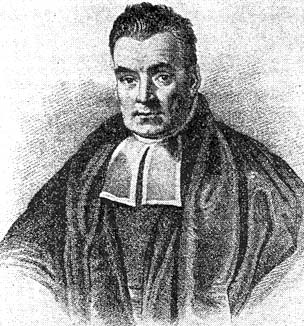Tales of Statisticians
Thomas Bayes
1702 - 17 April 1761Bayes is the most important statistician whose exact date of birth is unknown. This mystery may have something to do with the fact that he was the son of a Dissenting minister, Joshua Bayes.
In the quaint English 18th century, nearly all learning was the monopoly of the orthodox Church of England and its outposts Oxford and Cambridge. The Dissenting churches formed their own little network. Hazlitt has left a memorable portrait of that second culture of learning:
My father was a Dissenting minister at Wem, in Shropshire, and in the year 1798 Mr Coleridge came to Shrewsbury to succeed Mr Rowe in the spiritual charge of a Unitarian congregation there. My father lived ten miles from Shrewsbury, and was in the habit of exchanging visits with Mr Rowe, and with Mr Jenkins of Whitchurch (nine miles further on), according to the custom of Dissenting ministers in each other's neighborhoods. A line of communication is thus established, by which the flame of civil and religious liberty is kept alive, and nourishes its smoldering fire unquenchable, like the fires in the Agamemnon of Aeschylus, placed at different stations, that waited for ten long years to announce with their blazing pyramids the destruction of Troy. Coleridge had agreed to come over and see my father, according to the courtesy of the country. But in the meantime, I had gone to hear him preach the Sunday after his arrival. It was in January of 1798 that I rose one morning before daylight, to walk ten miles in the mud to hear this celebrated person preach.Like his father before him, Thomas Bayes was a Dissenter. He was privately educated. At first he assisted his father at Holborn; later, he became minister at the Presbyterian Chapel in Tunbridge Wells (the birthplace of Arthur Waley), 35 miles southeast of London. He was elected a member of the Royal Society in 1742. Following an unsuccessful attempt to do so in 1749, he finally retired from his ministry in 1752 but lived at Tunbridge Wells until his death, almost a decade later.

Tunbridge or no Tunbridge, Bayes's real congregation was the community of learning. During his lifetime, his chief publication was a 1736 reply to Bishop Berkeley, who had attacked the mathematics of Newton. (In the following century, the area in which English theology felt threatened would become, not mathematics, but geology and biology, and the chief proponents of that new thought would be Lyell, Hooker, Wallace, and Darwin). Bayes communicated some of his own mathematical results to the Royal Society. His Essay Towards Solving a Problem in the Doctrine of Chances was found among his papers after his death, and published in the Philosophical Transactions of the Society in 1764.
In communicating it to the Society, Richard Price noted that that Bayes
"afterwards considered that the postulate on which he had argued might not perhaps be looked upon by all as reasonable, and therefore he chose to lay down in another form the proposition in which he thought the solution of the problem is contained."Laplace accepted Bayes's conclusions in a memoir of 1781, but they were challenged by Boole in The Laws of Thought (1854), and have remained controversial ever since. The core of the difference is the possibility of making assumptions about an unknown probability; for an Oxford opinion, see Bulmer 171f. Lucien Le Cam has recalled that, doubtless due to the influence of Laplace, Bayesian ideas were esteemed by some in France by 1950, well before they were taken up by American statisticians. But taken up they eventually were. One leading American Bayesian was Jimmie Savage, who insisted that all valid statistics can be derived from a Bayesian starting point. A widely known application of Bayesian ideas was the Mosteller-Wallace study of the problem of authorship in the Federalist Papers (1964). That particular problem, as it happens, can also be attacked, with equal or superior results, without Bayesian assumptions.
Bayes's tomb in the Bunhill ("Bonehill") Cemetery in London, a burial ground for Dissenters, has recently been labeled and restored with contributions from statisticians around the world. His birthdate still eludes posterity. His monument is of course his Theorem, about which statisticians around the world continue to argue. That still contested legacy is, beyond all argument, a major part of modern statistics.
Statistics is Copyright © 2001- by E Bruce Brooks
14 Sept 2005 / Contact The Project / Exit to Statistics Page